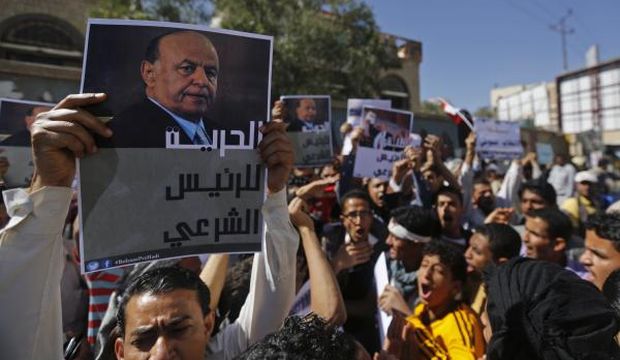
A protester holds up a poster of Yemen’s former president Abd Rabbuh Mansur Hadi during an anti-Houthi demonstration in Sana’a, Yemen, on February 21, 2015. (Reuters/Khaled Abdullah)
Sana’a, Asharq Al-Awsat—Yemen’s Abd Rabbuh Mansur Hadi, who resigned as president of the country last month and has been under a month-long house arrest in Sana’a, on Saturday escaped to the south of the country and appeared to rescind his resignation.
Hadi, who had been held at his home in the capital since January 22 by the Shi’ite Houthi movement currently in de facto control of the country, released a statement from the southern port city of Aden on Saturday, which he signed as “the president of the Yemeni Republic,” condemning the recent takeover of political power in the country by the Houthis as an “illegitimate coup.”
Hadi also called on the international community to intervene to return the country to implementing the outcomes of the Gulf Initiative signed in January of 2014, which laid down a political road map for the country agreed on by its main political parties and factions.
Following news of Hadi’s escape, the Houthi movement announced that its “Revolutionary Council” temporarily set up to run the country’s affairs met on Saturday at the presidential palace in Sana’a.
The Council released a statement saying the ease of Hadi’s escape proved he had not been under house arrest imposed by armed members of the movement as had been reported and accused Hadi of colluding with foreign countries in order to destabilize Yemen.
The Houthis’ power-grab began in September after the movement occupied Sana’a following a month-long series of mass protests and sit-ins demanding the resignation of the government and the reinstatement of fuel subsidies slashed by the state.
Despite signing an agreement that month with President Hadi to end all acts of violence, vacate government and military buildings and facilities, and return any weapons seized back to the state during their takeover of the capital, reports since then suggest the Houthis have been flouting the agreement and continuing their spread across Yemen—allegedly seeking a repeat of the scenario in Sana’a.
The movement’s efforts culminated with the announcement of its “constitutional declaration” last month which stipulated the formation of a new parliament and government, as well as an interim presidential council to oversee the country’s affairs, after Hadi and former premier Khaled Bahah resigned last month.
Bahah, along with former foreign minister Abdullah Al-Saidi and a number of other former government officials, remain under house arrest in Sana’a.
The exact manner of Hadi’s escape to Aden, meanwhile, remains unknown, with several conflicting reports currently circulating as to how this took place.
Some reports have maintained Hadi’s “escape” came about after an agreement with the Houthi movement’s leadership, who are seeking to avoid any international response to their power-grab following a unanimous UN Security Council resolution on February 15 which warned of international action against the Houthis and called for Hadi’s release by the end of the month.
Yemeni security sources, speaking to Asharq Al-Awsat on condition of anonymity, have offered alternative explanations, contending that Hadi was freed from his house arrest by members of the Yemeni special forces after they clashed with the armed Houthis guarding Hadi’s compound.
Speaking to Asharq Al-Awsat, Hadi adviser Faris Al-Saqqaf said however the scenario was likely much less complicated, and offered an alternative explanation.
“This is a simple matter and we don’t need to invoke the United Nations or the involvement of any Yemeni special forces as has been said,” Saqqaf said.
Saqqaf speculated that Hadi could have escaped—perhaps with the help of a close aide or under disguise—as a result of the the Houthi guards’ complacency or negligence in their duties, “especially considering that his health is frail and he needs medication.”
“After being placed under house arrest for more than a month, it is expected that there will be some mistakes committed by those guarding the compound,” he added.
On Sunday, Aden’s local television channel broadcast footage of Hadi meeting with the governors of several southern provinces and military commanders in a presidential retreat in the city, in another sign he was ready to resume his presidential duties.
The city’s governor, Abdulaziz Habtoor, told the Associated Press on Sunday Hadi was still the legitimate president of the country
He said Hadi’s resignation last month was null-and-void since the Yemeni constitution stipulates the president may only resign before his term ends if parliament accepts his resignation—and at the time of Hadi’s resignation parliament had already been dissolved by the Houthis.
Hamdan Al-Rahbi contributed additional reporting.
